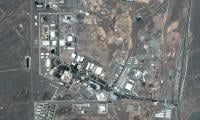Why this happened is not complicated. Ever since the British, supported by the US, cheated the Palestinians of their land, which they administered as trustees after the breakup of the Ottoman Empire, and virtually handed part of it to the Zionists, neither the British nor the Americans have looked back.
It’s been blind and unjustified support to the Zionist state at the cost of Arab peace, security and dignity. After the birth of Israel in 1948, opposed publicly Pakistan founder Mohammad Ali Jinnah, the US and the UK strengthened the illegitimate rogue state by providing it boundless economic and military aid and giving it the licence to conduct any amount of atrocities ranging from the expulsion of rightful owners of Palestine from their homeland to their massacres in Lebanon’s Sabra Shatila camps – and the rest is history.
Israel, the only country without defined borders, is seeking to create a Greater Israel at the expense of the land of its now-divided Arab neighbours. It exists beyond the realm of law and legitimacy. In the name of its security, its patrons – the US and the UK – declare all its actions kosher. The ongoing genocide of Palestinians in Gaza is no exception.
Emboldened by the absence of any practical or consequential censure for its actions, Israel launched an attack on Iran 72 hours ago, aiming to decapitate Iran’s nuclear capability. This was clearly not done without US support; it was evidently carried out with the full knowledge of the Trump administration. In fact, throughout the attack, the US played a role in supporting Israel, reportedly even assisting in refuelling Israeli jets at their bases in Qatar.
Israel launched this assault after successfully penetrating Iran’s multilayered security cordon. The evidence of this infiltration has existed since the high-level assassinations carried out by Israel in Tehran in 2020. Such actions were not possible without months and even years of military preparation. Israel also calculated that no nation would actively enter the battle to support Iran. On the contrary, the US, India, the UK and others would likely offer active military support to Israel.
The entire edifice of the global security system, which partially existed, no longer does. It’s the world according to Israel; the construct is clearly the one that Israel has wanted, as we witness the wiping out of Palestinians through genocide in the West Bank and Gaza. Through systematic planning in the 1990s onwards, Israel, in cooperation with the US, began knocking out forces in the region that Israel marked as a threat to its existence. It began with identifying and destroying Iraq’s armed forces under Saddam. Then it was others, including Hezbollah, which they decimated. Then Israel’s influence, on its own terms, facilitated by the US, expanded within the Arab World.
Israel has assassinated Iran’s top military commanders and nuclear scientists and conducted multi-layered attacks on Iran's nuclear facilities. In response to these attacks and to Trump’s threat of complete annihilation unless Tehran agreed to return to negotiations, Iran has retaliated with missile attacks. US media confirmed that Iranian missiles have penetrated Israel’s air defence systems – its Iron Dome invincibility myth has been shattered. Clearly, Israel’s key allies, the US and UK, will frantically ferry all their deployed military assets to Israel’s aid.
In any event, Iran’s response has come. It challenges and threatens the US-UK strategic arrangement in the region – an arrangement painstakingly and gradually put together, woven actually over a hundred years ago, beginning with the breakup of the Ottoman Empire. Ever since, the US and UK have consistently, under all circumstances and at a heavy cost to the Arab and Muslim world, supported the Zionist regime.
Till the 1970s, the Arab world stood united. But after the 1974 Arab-Israeli war, when the Arabs pushed back the Israelis, the Arabs became divided. US foreign policy guru and leading Zionist supporter within US policy circles, Henry Kissinger, actively adopted the 'salami tactics' policy to break up Arab unity. First came the Egypt-Israeli Accord, and then, like dominoes, others too fell into the US camp.
In the military battle, Iran faces an insurmountable challenge. Having struck back with missiles that caused large-scale destruction in Israel – unprecedented in recent decades – Israel has responded with further waves of attacks. It now appears to be a fight to the end, unless Iran’s terms are factored into any negotiation offer. Otherwise, Iran may be militarily weakened into accepting a ceasefire on Israeli terms. Netanyahu has said the current operation was conceived for two weeks. Israel's declared objective is to destroy Iran's nuclear facilities and its missile stockpiles completely. Are these achievable targets? Not easily.
First, these are facilities buried deep under mountains or 50 yards beneath the desert, making them difficult to access. Second, over the past 20 years, Israel and the US have jointly attempted to dismantle Iran’s nuclear programme through cyberattacks, assassinations of scientists, and destruction of centrifuges and other infrastructure.
According to David Sanger, all of this has merely delayed, not destroyed, Iran’s nuclear bomb-making capability. And such delays, he argues, are better achieved through dialogue.
Hence, the critical question regarding Israel’s current multi-pronged attack on Iran is how soon and if at all it can irreversibly decapitate Iran’s nuclear weapons capability. This is not likely to be simple or straightforward. What is publicly known is that Iran's core nuclear facility at Natanz, where near bomb grade fuel is being produced, has been targeted and damaged. Regarding the Fordow facility, where Iran’s other major nuclear enrichment site has been attacked, no reports are available for now.
Israel appears to have plunged into a conflict of undetermined duration, scale and complexity. However, its optimism about success stems from the politico-diplomatic and military support it enjoys from the US, the UK and their assets deployed in the region. This optimism is misplaced.
While Israel believes it has time and the active support of its allies on its side – and Iran, aside from verbal support from friends, cannot count on any meaningful backing – the question then is: what is Iran banking on beyond its courage, resolve and determination?
The writer is a senior journalist. She tweets at @nasimzehra and can be reached at: nasimzehra@gmail.com
Programme contributes to biodiversity conservation and improved watershed management
Algorithms can assist, but only humans can weigh morality, emotion and fairness
Since report’s inception in 2006, Pakistan has remains anchored in lowest decile
Traditional hierarchical models are becoming obsolete, as many countries have embraced flattened, more agile structures
Online harms should be regulated, but not at the expense of fundamental rights
With multi-billion-rupee budget surpluses, Pakistan's provinces can emulate global precedents, ensuring sustained...







